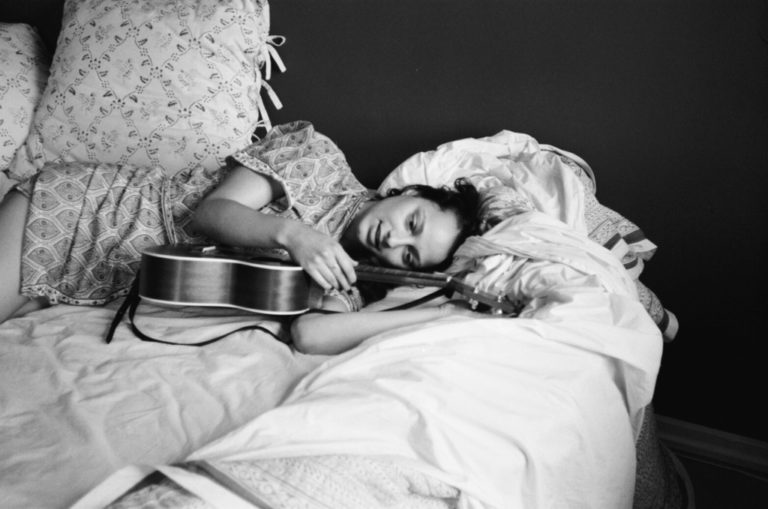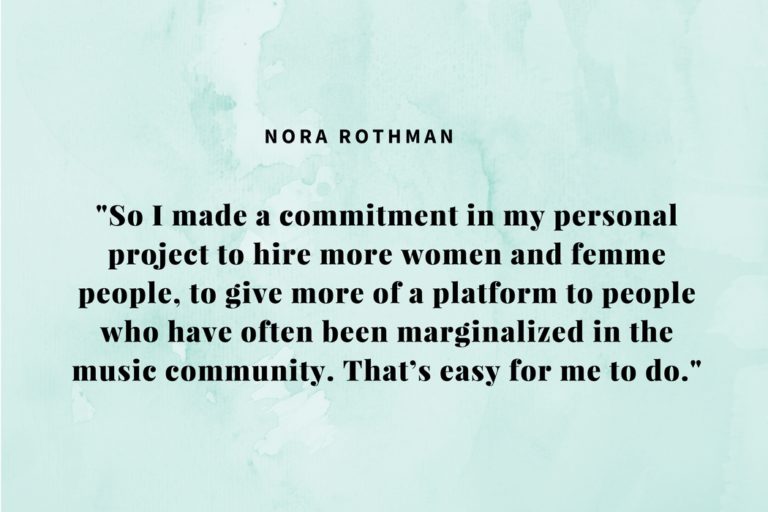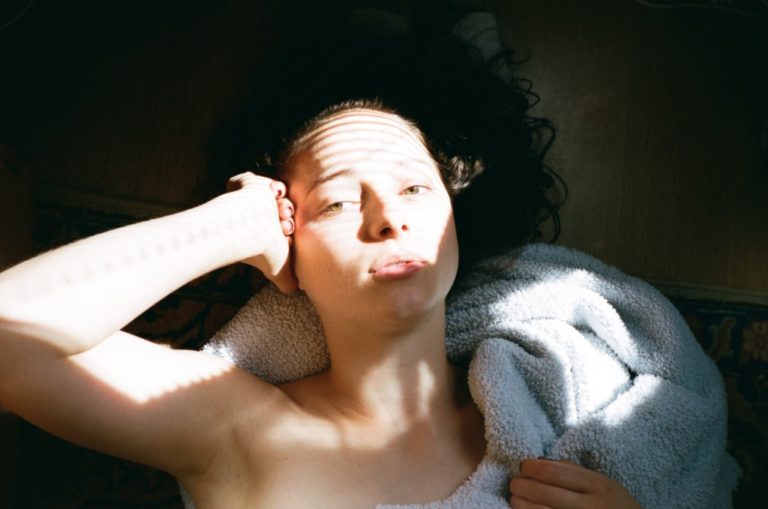The former Clinton campaigner on her upcoming release and her resource-providing website for femme musicians.
by Anna Meyer
Photos courtesy of Nora Rothman
Folk and soul singer-songwriter Nora Rothman is combining her two biggest passions in the world: music and social justice. She’s the founder of Earhart, a community of women, trans and gender non-conforming artists that provides resources and promotion to female-identifying musicians. On Earhart, artists create and share playlists that highlight other female-identifying artists as a way to promote community and follow their mission to “raise the femme voice.” Seattle-based Rothman also keeps active by producing her own music, which combines her jazz-like vocals with soft ukulele melodies.
Rothman’s debut self-titled EP came out last summer, but on April 20th she released a remix EP via Electric Bird Records of her songs with a unique focus and approach. The remix EP features remixes from an all female-identifying team of producers and artists, and half of the remix EP’s proceeds from its pay-what-you-want price tag will be donated to Planned Parenthood.
The inspiration? It started in an acting class in Los Angeles where a teacher was sexist toward Rothman. That’s when she took a music hiatus and decided to focus on politics.
“I was like, ‘I have to go do this,’” Rothman recalls. “If I’m able, I want to be sure that I’ve done everything that I could possibly do.”
Rothman became a Colorado fieldworker for Hillary Clinton’s 2016 presidential campaign, where her efforts helped produce a record voter turnout in her area. But it wasn’t until after her work with Clinton’s campaign when she finally combined her activism with her music.
I got the chance to talk with Rothman about merging her two passions, why music is the best medium to discuss political thoughts and what it was like to hear remixes of her own music.

Anna Meyer: Why did you change focus from working on Clinton’s campaign to then working on your music?
Nora Rothman: It’s weird because the two things had always been in my mind very separate. After the campaign, I realized that they didn’t have to be and that art is even more essential now than it ever has been in my lifetime. Because it’s the one thing through which we can still learn from each other without it being political, or without it being antagonistic or exclusive.
Something that we really need in the world right now is more voices sharing their stories. If a song that’s written by a super progressive liberal in [Los Angeles] can reach an uber conservative in western Pennsylvania, and those two people can find a common ground, I think that’s incredibly powerful.
After the campaign I decided that I was going to really continue to throw myself into both music and activism and find a way to make those things exist symbiotically. So I made a commitment in my personal project to hire more women and femme people, to give more of a platform to people who have often been marginalized in the music community. That’s easy for me to do.

So, I started that way, and then I sort of had the inspiration to make this remixes EP and, again, hire female-identifying producers—who are also the best producers—and then use that as both an awareness tool and a fundraiser [to] raise money for the organizations that are really fighting hard for women. In this case, we chose Planned Parenthood.
AM: You talked a little bit about how music is a great way to transgress boundaries when talking about political matters. Can you expand on that? How else is music the best way to communicate and express these feelings that are in politics?
NR: I think the key is that the best music is about some kind of essential human truth. People love music because they find it relatable in some way. They see a little bit of themselves in it, or they learn a little bit about themselves because of it. It could just be a completely instrumental track, but it just articulates that one feeling that you didn’t think anyone else could understand.
Ultimately, [that’s] empathy. It’s just an empathy machine. So if people on opposite ends of whatever spectrum—whether that’s opposite ends of the world, opposite ends of the political spectrum, opposite ends of the gender spectrum—if they can listen to something that was written by or made by [someone] completely opposite of them and realize, “Oh, we feel the same thing,” suddenly people aren’t aliens anymore. They’re seen as real people that also have feelings same as yours. You can’t continue to deny their humanity in that way.
AM: Absolutely. I also wanted to talk a little bit about Earhart. What happens in a community and on a platform like Earhart that gives space and showcases marginalized voices that doesn’t happen on an average music site or in an average music review?
NR: I think what is the most special about this community is that it’s putting the power in the hands of the artists. It’s all about giving them the opportunity to speak and opportunity to curate. Playlists right now are so huge. We’re all at the mercy of these playlists curators, and we don’t know where they are, where they live and whether you should email them or you pay someone else to email them. [Laughs]. It’s a crazy, crazy time for that.
So this is a place where artists have the power to curate a playlist that has a ton of followers, and they can put their songs on it and the songs of other artists on it and put those things side by side. And so it gives artists a chance to have ownership over the piece and really have some creative expression in their playlist as well. And then, as you noticed, there are a bunch of resources on [the site] also, and we’re hoping to expand that and keep expanding to be really not just a place to promote the work of different people, but a place to empower that work and help that work — not just share it.
AM: Yeah! So with this upcoming EP release, what are you most proud of?
NR: I’m most proud of sticking to my convictions. It’s really unfortunate, but as it is right now, [I] can send out a text message to all of [my] friends in music and say, “Hey, looking for a female-identifying person to jump on this project with me. Who do you know?” And most of them in my network initially hit me back and said, “Oh sorry, can’t really think of anyone. Sorry.”
So at first you’re like, “Oh, shit. This is going to be really hard. I’m going to have to find people, etc.” But I suppose I’m proud that I doubled down and continued to make the effort because I was so lucky to end up being in touch with the five people who made these incredible remixes for me. I just truly sent these tracks off and received these incredible, wonderful pieces of music from all different corners of the country, and that to me was really spectacular.

AM: What’s it like as an artist to hear remixes of your own work?
NR: It’s so cool! It’s so effing cool. I think the best work comes from collaboration, and that’s two minds in one room coming up with something that neither mind would’ve come up with on their own. Hearing the ways in which my songs—my little ol’ songs—inspired these artists to make something new was really humbling and exciting.

Anna Meyer is The Riveter’s Digital Editor. She spends most of her funds on concert tickets, traveling the world and doing all things fueled by her daily espresso. Her work has also appeared in Clover Letter, Shine Text and Inc. magazine. You can follow her on Instagram and Twitter and stay updated with her work via her personal website.




